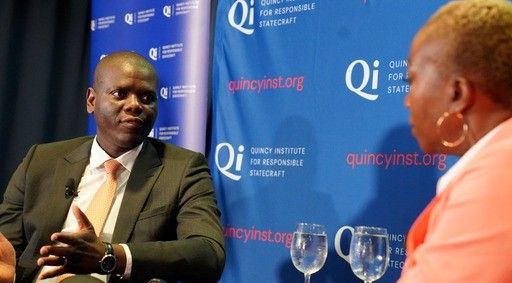In his first official visit to Washington since his appointment in June, Ronald Lamola, South Africa's Minister of International Relations and Cooperation, was quite frank about global obligations regarding Gaza.
“We are clear in our condemnation of what we believe is genocide that is happening,” he said of the Israel war in the Gaza Strip and the case that South Africa has brought to the International Court of Justice. The court in January agreed there were "plausible" grounds for South Africa to make a case that what is happening in Gaza is genocide. The ICJ has not made a final ruling on the question of genocide under the 1948 Genocide Convention (of which Israel is not a member).
As for South Africa's other case, on the impact of Israel’s illegal occupation of the West Bank and Gaza, Lamola likened his own country’s history with apartheid to what Palestinians are enduring in the territories.
“(It’s) similar to what we had gone through as a country,” he said at the event hosted by the Quincy Institute at the National Press Club Tuesday morning. “We have a moral obligation, more than any other country in the world, to stand up and say what Israel is doing is unlawful… having lived the experience of what Palestinians are currently experiencing.”
He was responding to a question asked by interviewer and MSNBC host Joy Reid, who noted that a world-wide campaign of boycott and divestment had led to the collapse of the apartheid government in South Africa in 1990. Should the world be doing the same for Palestinians, she asked, acknowledging that this is a radioactive issue in Washington and in many states, which have tried to ban BDS (Boycott, Divestment, Sanctions) movements against Israel for years.
Lamola didn’t hesitate. “There is no reason that there should not be action taken by member states to put the necessary pressure on the state of Israel,” to stop fueling its military operations (which South Africa believes is a genocide) against Palestinians in Gaza, he said, and that includes an arms embargo. Right now Israel has no “disincentive” to end the war, he added. He did not say anything about the war crimes charges against Hamas leaders or the group's obligations to release the hostages taken during its Oct. 7 attack on Israel, which began the war 11 months ago.
Since January the ICJ has issued several orders to Israel, including opening up Gaza to humanitarian aid, to stop its illegal occupation, and to not invade Rafah. The court has no enforcement powers and depends on member states to put on the pressure. The U.S., which is a member, has chosen to rebuke the court for its rulings. Meanwhile, accounts by journalists who have been allowed to see Rafah have said the place is now decimated.
Lamola said more countries are "pushing for change" and "beginning to say something is wrong." South Africa already had strong support for its cases from the Global South. As of June more than 10 countries have officially joined or broadcast intention to join the genocide case, including Turkey, Egypt, and Spain. In February, some 52 countries spoke in favor of South Africa’s case against Israel’s occupation policies.
For its part, Israel has said the questions put to the court are biased and false and that the rulings undermine the delicate peace process. The U.S. government has largely supported Israel’s responses to the ICJ since the beginning of the year.
"We have been clear that Israel's program of government support for settlements is both inconsistent with international law and obstructs the cause of peace," a State Department spokesperson said after the ruling on occupation in June. "However, we are concerned that the breadth of the court's opinion will complicate efforts to resolve the conflict," the spokesperson added.
Lamola said South Africa supports not only the broader peace process, but current talks in Doha for a ceasefire.
He has similar thoughts on the Ukraine conflict too. When asked by Reid what South Africa’s response to Russia’s refusal to return lands taken from Ukraine in that war, Lamola said South Africa (which has pursued a more neutral stance than the West) supports diplomacy, not further war. South Africa supports Ukraine’s rights to "territorial integrity and independence,” but “we don’t see how you can resolve the conflict without engaging both parties," he said. "This is our view. Russia must be brought to the table, to engage with these issues and to find a resolution. The same with Palestine."
F
















